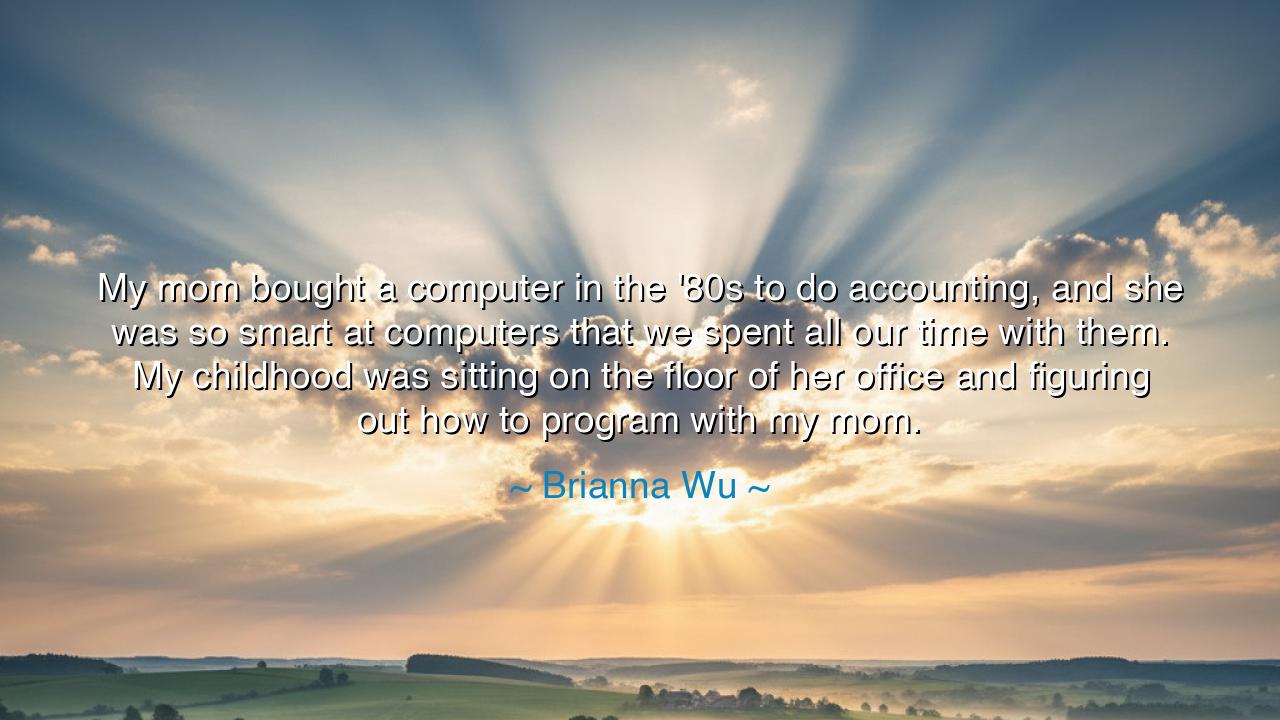
My mom bought a computer in the '80s to do accounting, and she
My mom bought a computer in the '80s to do accounting, and she was so smart at computers that we spent all our time with them. My childhood was sitting on the floor of her office and figuring out how to program with my mom.






The words of Brianna Wu—“My mom bought a computer in the '80s to do accounting, and she was so smart at computers that we spent all our time with them. My childhood was sitting on the floor of her office and figuring out how to program with my mom.”—are at once simple and profound, a testament to the power of curiosity, mentorship, and early exposure to knowledge. Within this memory lies an ancient truth: that the foundations of wisdom are laid not only in classrooms or libraries but in the intimate spaces where a child watches, imitates, and learns from the hands of a parent or guide. It is here, amid the hum of machinery and the glow of a screen, that the mind is awakened to possibility and creation.
In these words, we see the merging of technology and familial love, a sacred union that mirrors the apprenticeship traditions of old. Just as the sons and daughters of craftsmen in Athens or Rome learned their trade by sitting at the feet of their elders, so did Brianna Wu learn the craft of programming from her mother. The act of programming together was not merely a task—it was a shared ritual, a passing of knowledge, a bond strengthened by attention, patience, and challenge. The child learns to think, to question, to create—while the mentor models the mastery of thought and practice.
The origin of this quote lies in the dawn of the personal computing revolution, a time when machines were still rare, mysterious, and wondrous. In the 1980s, computers were not toys—they were portals into a new realm, capable of logic, calculation, and creation beyond the imagination of the average household. Brianna Wu’s mother, already proficient at navigating these machines, became a guide into this unknown land, turning the home into a temple of learning. Her initiative reflects a timeless principle: knowledge is most potent when shared, most transformative when experienced through practice and wonder.
Her memory also speaks to the power of early influence. By spending her childhood on the office floor, exploring programming alongside her mother, Wu absorbed not only technical skill but the values of diligence, curiosity, and resilience. In the ancient world, children who apprenticed with blacksmiths, scribes, or healers did not simply learn a craft—they absorbed a worldview, a way of seeing and engaging with the world. Similarly, Wu’s early experiences with computers shaped her understanding of what was possible, laying the groundwork for a lifetime of innovation, courage, and leadership.
Consider the story of Ada Lovelace, often called the first computer programmer, who, in the early 19th century, learned mathematics and logic under the guidance of tutors and mentors. Like Wu, her brilliance was nurtured through early exposure, attentive guidance, and hands-on experience. Her apprenticeship allowed her to imagine machines performing not only calculations but creative functions. Wu’s reflection mirrors this ancient truth: that the seeds of genius are often sown in the soil of early practice and mentorship, where curiosity is nurtured and imagination is allowed to flourish.
Yet, there is a deeper lesson here beyond skill acquisition. Wu’s words remind us that learning is a relational act, a shared journey between generations. The technology itself—the computer, the code—becomes a medium for connection, understanding, and love. The child learns not in isolation but in communion, absorbing not only knowledge but also values, habits, and the courage to explore the unknown. This mirrors the wisdom of the ancients, who saw education not as the filling of vessels, but as the shaping of character and the cultivation of the soul.
Therefore, the teaching embedded in her words is clear: to nurture wisdom, creativity, and resilience, one must provide access, guidance, and presence. Let children sit at the feet of those who know, let them explore tools and ideas under watchful and loving eyes, and let curiosity be celebrated as sacred. The medium—whether stone, quill, or silicon—is secondary to the act of shared discovery, which transforms ordinary moments into lifelong lessons.
And so, my children, remember this eternal truth: the spark of understanding often ignites in quiet spaces, beside those who guide us patiently, in hands-on practice, in attentive observation. Just as Brianna Wu learned programming on the office floor with her mother, so too can you discover the world’s mysteries when you immerse yourself with curiosity, humility, and companionship. For knowledge is not a solitary treasure—it is a gift that multiplies when shared, a flame passed from one generation to the next, lighting the way to innovation, courage, and the extraordinary.






AAdministratorAdministrator
Welcome, honored guests. Please leave a comment, we will respond soon